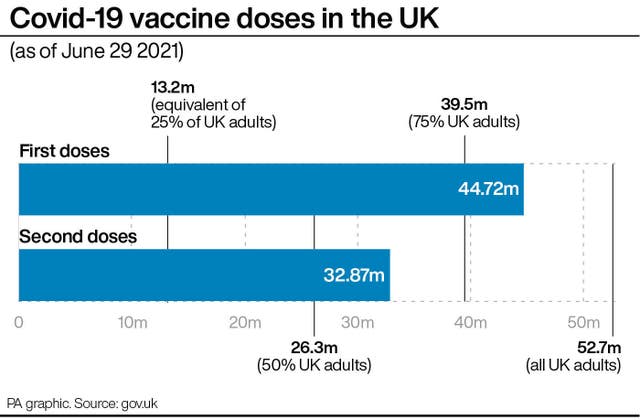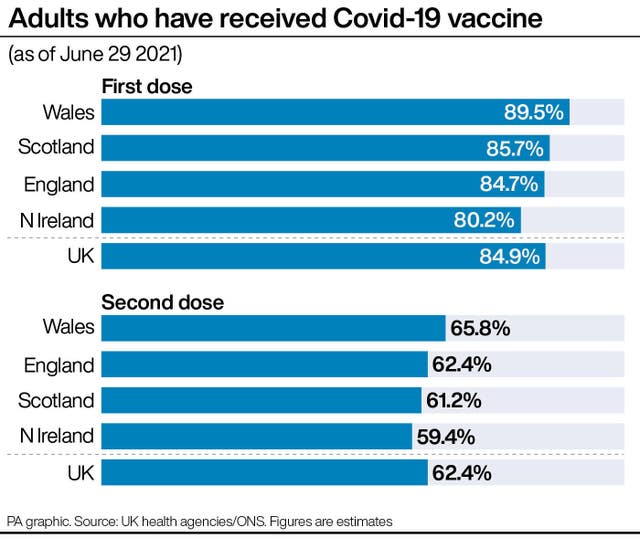UK urged to share Covid vaccines with the world at same time as booster rollout
A booster programme could begin for 32 million people in the UK as soon as September, officials have said.

Proposals to offer coronavirus vaccine boosters in the UK should take into account sharing doses with other countries around the world, campaigners have said.
While Britons could be offered a third jab in the autumn, millions of people in other parts of the globe have not had a first one, the One Campaign warned, adding: “The best way to protect people at home is to share doses with other countries now.”
A Covid-19 vaccination booster programme could begin for 32 million people in the UK as soon as September, officials have said.
New interim guidance from experts advising the Government sets out the priority list for who should get a third jab if a booster programme is needed.
The plans have been drawn up to ensure the NHS is prepared for any possible booster campaign while officials await more data on whether a third vaccine is required to bolster protection over the winter months.
It will coincide with the rollout of flu jabs, which health officials have said will be vital this winter as they prepare for a potentially difficult influenza season.
The UK is the first country in the world to publish interim guidance on a Covid-19 vaccine booster campaign, though a number of other countries are considering proposals.
Officials have stressed that a third vaccine may not be needed but scientific advisers to the Government have said they are “taking no chances” and want to give the health service as much time as possible to plan.
Final guidance from the Joint Committee on Vaccination and Immunisation (JCVI) will be set out before September.

Romilly Greenhill, UK director of the One Campaign, which works for fairer vaccine distribution around the world, said there had been a “moral and scientific failure that stems from rich countries hoarding doses”.
She said: “We need to be thinking bigger – it’s important to ensure people are protected at home – but it needs to happen at the same time as sharing doses with other countries.
“There are millions of people around the world who have not had their first shot, let alone thinking about a third, and there is still limited evidence of the efficacy or need for boosters at this point.
“The best way to protect people at home is to share doses with other countries now, as nobody is safe until everybody is safe.”
Dr David Elliman, a consultant in community child health, questioned whether a booster programme could “in all conscience” be justified when “in large parts of the world, there is not enough vaccine to give one dose to the adult population”.

The JCVI interim guidance sets out two stages for the booster programme, first looking at 15 million of the most vulnerable including over-70s, health and care workers and older care home residents.
The second stage would extend to a further 17 million people including over-50s, adults over the age of 16 who usually are offered a free NHS flu jab, those aged 16-49 in a Covid at-risk group, and people who are in regular contact with someone who is immunocompromised.
Professor Wei Shen Lim, Covid-19 chairman for the committee, said: “We will continue to review emerging scientific data over the next few months, including data relating to the duration of immunity from the current vaccines. Our final advice on booster vaccination may change substantially.”
People will be offered a single jab as a booster, so the rollout will be logistically easier for the NHS.
Dr Richard Vautrey, GP committee chairman at the British Medical Association, welcomed the early notice of the potential plans and called on the Government to “listen to practices when they outline the support they need” for any future jabs rollout.
He added: “As all doctors well know, winter brings with it a surge in illnesses and infections, and we hope that by protecting our most vulnerable patients with both Covid-19 and flu vaccines, we will prevent more people becoming seriously ill and dying.
“In turn, we hope that this will alleviate pressures on the whole NHS and social care, at a time when we know it is always at its most strained.”
It is not yet known whether people will be offered the same vaccine, or a different one, but advisers said “all possibilities are on the table”.
Officials will know more when they get results from the CovBoost trial, which is expected to report back in August.
Meanwhile experts have called for the official list of Covid-19 symptoms to be expanded, saying the existing one could “miss many Covid-19 cases”.
Writing in the BMJ, they suggest that limiting testing to only people with fever, cough and a change in taste or smell could “miss or delay identification of many Covid cases” and this could “hamper efforts to interrupt transmission”.
The latest results of the Covid-19 schools infection survey for England, from the Office for National Statistics, are due on Thursday.
They will give estimates of staff and pupils testing positive for coronavirus across a sample of schools in May, in a week that has seen concerns about high numbers of children having to miss school while they isolate due to contacts having the virus.
Education Secretary Gavin Williamson has indicated that school bubbles could be scrapped on July 19 as part of the next step of easing restrictions in England.
Speaking in the Commons on Wednesday, he also said he wants to end regular Covid-19 testing for schoolchildren “at the earliest and most realistic possible stage”, although he acknowledged this was a long-term aim.





